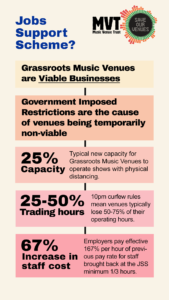Following the chancellor’s statement last week the Music Venue Trust have issued an open letter to Rishi Sunak, Oliver Dowden and Boris Johnson. Read it below:
“Grassroots Music Venues have faced a tough couple of decades. For the first time in twenty years, thanks to a combined effort by the sector itself, national government, local government, the music industry, artists, audiences, local communities and Music Venue Trust, 2019 was the first time since 2000 that the year finished with more trading grassroots music venues than it started.
This was a remarkable turn around, a fantastic concerted effort to make a sector that had become economically unsustainable viable once again. To achieve that, all sorts of steps had to be taken. The planning framework had to be changed, working practices had to be changed, adjustments had to be made to rights collection fees and charges, business rate demands had to be adjusted. Everyone had to work together and act together to protect, secure and improve grassroots music venues; this government took a lead role in much of that work. Boris Johnson, when Mayor of London, commissioned and enacted a report on exactly this issue. Everyone who played a role in that effort understood that grassroots music venues are vital to the health of our world beating music industry, to the communities they serve, and to the future development of British talent.
Since March, the same government that worked hard with us to make grassroots music venues viable again has introduced a series of restrictions and limitations on the ability of the whole night time economy, including grassroots music venues, to be economically viable. These controls, demanded by the government to address perceived risk from Coronavirus, first of all shut the entire sector and now have slashed capacities by 75%, cut trading hours by 50 to 75%, limited performances and performers, and introduced significant additional costs on venues to present live events under severely limited conditions. All of these measures, the government states, are temporary conditions required by the government to temporarily control the risk of infection.
To describe Grassroots Music Venues, after all that effort and work by multiple agencies across several years, as inherently unviable businesses and the people who work in them as occupying inherently unviable jobs is, frankly, absurd.
The government has sought to manage the infection rate by singling out the night time economy for special and specific restrictions as it believes that this section of our economy, community and society presents a source of special and specific potential infection risks. The government’s own published scientific data does not seem to support or justify this approach as an effective mechanism for managing the risk of infection.
We strongly urge the government to publish the data linking the spread of infection to the consumption of alcohol and enjoyment of culture in licensed premises after 10.00pm, not least on the basis of the need to address public confidence in the measures being taken. Assuming that the government has such data, making a specific connection between late night and/or cultural activity and infection, that it has chosen not to publish, or to provide privately to the sector, the same conclusion about the long and short term viability of grassroots music venues would remain.
Grassroots music venues, and every other part of the night time economy, have become temporarily unviable because government restrictions and limitations have made them so. The government cannot simply shrug its shoulders at 900 grassroots music venues being permanently lost, over 200,000 jobs being permanently lost, and over £5billion in current and future economic activity that the country risks permanently losing because of the temporary decisions it is making.
The government has a duty to temporarily protect the venues it is temporarily restricting. Music Venue Trust remains committed to working and acting together with the government to ensure that the long term viability of grassroots music venues, achieved by immense hard work in the last few years, returns after this temporary crisis.
There is no need at all to permanently lose Grassroots Music Venues, permanently depriving artists, audiences and communities of access to work, creativity and culture, because of temporary challenges caused to the sector by this crisis.
If we work together, we can Reopen Every Venue Safely.”





